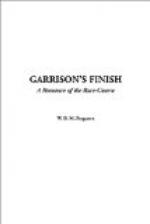Major Calvert’s really interested desire to see his pseudo nephew astride a mount afforded Garrison the legitimate opportunity of keeping clear of Mr. Waterbury for the next few days. The track was situated some three miles from Calvert House—a modern racing-stable in every sense of the word—and early the next morning Garrison started forth, accompanied by the indefatigable major.
Curiosity was stirring in the latter’s heart. He had long been searching for a fitting rider for the erratic and sensitive Dixie—whimsical and uncertain of taste as any woman—and though he could not bring himself to believe in Crimmins’ eulogy of Garrison’s riding ability, he was anxious to ascertain how far the trainer had erred.
Crimmins was not given to airing his abortive sense of humor overmuch, and he was a sound judge of horse and man. If he was right—but the major had to laugh at such a possibility. Garrison to ride like that! He who had confessed he had never thrown a leg over a horse before! By a freak of nature he might possess the instinct but not the ability.
Perhaps he even might possess the qualifications of an exercise-boy; he had the build—a stripling who possessed both sinew and muscle, but who looked fatty tissue. But the major well knew that it is one thing to qualify as an exercise-boy and quite another to toe the mark as a jockey. For the former it is only necessary to have good hands, a good seat in the saddle, and to implicitly obey a trainer’s instructions. No initiative is required. But it is absolutely essential that a boy should own all these adjuncts and many others—quickness of perception, unlimited daring, and alertness to make a jockey. No truer summing up of the necessary qualifications is there than the old and famous “Father Bill” Daly’s doggerel and appended note:
“Just a tinge
of wickedness,
With a touch of devil-may-care;
Just a bit of bone and
meat,
With plenty of nerve
to dare.
And, on top of all things—he
must be a tough kid.”
And “Father Bill” Daly ought to know above all others, for he has trained more famous jockeys than any other man in America.
There are two essential points in the training of race-horses—secrecy and ability. Crimmins possessed both, but the scheduled situation of the Calvert stables rendered the secret “trying out” of racers before track entry unnecessary. It is only fair to state that if Major Calvert had left his trainer to his own judgment his stable would have made a better showing than it had. But the major’s disposition and unlimited time caused him more often than not to follow the racing paraphrase: “Dubs butt in where trainers fear to tread.”
He was so enthusiastic and ignorant over horses that he insisted upon campaigns that had only the merit of good intentions to recommend them. Some highly paid trainers throw up their positions when their millionaire owners assume the role of dictator, but Crimmins very seldom lost his temper. The major was so boyishly good-hearted and bull-headed that Crimmins had come to view his master’s racing aspirations almost as an expensive joke.




